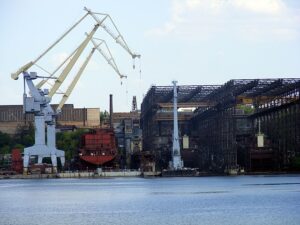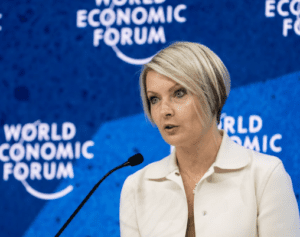
Smart Holding’s Smart Maritime Group (SMG), which unites Kherson and Mykolaiv shipyards, has resumed ship repair at Mykolaiv shipyard after a year and a half break.
According to SMG’s press release, the first client after the forced pause was DELTA III, a tugboat built in 2006.
SMG specialists are performing scheduled maintenance, which includes cleaning and painting the hull, servicing the main mechanisms, including the engine and navigation system.
The owner of the tug, Delta Tag LLC from Mykolaiv, has been a regular customer of Smart Maritime Group since 2020, ordering ship repair services for its fourth vessel.
“We are accustomed to the high quality of work and professional service that our vehicles receive here. Due to military threats at sea, we cannot access other repair assets, but we still wanted to return to a proven service. Therefore, we are glad to resume the shipyard’s work, it is important to have specialists here in Ukraine,” said the company’s CEO Oleksandr Korenetskyi, as quoted by the press service.
In 2021, SMG modernized six bunkers and repaired 51 vessels and increased revenue by 17% to UAH 440 million. However, in 2022, due to Russia’s full-scale invasion, the company was forced to terminate previously concluded contracts, including the construction of two hulls for a Dutch company, a complete tugboat for a Ukrainian customer, and an agreement for the manufacture of metal structures. The Kherson shipyard was under occupation and out of the company’s control, but even after the liberation, the production facilities are under constant shelling, making it impossible to resume work. Therefore, the ships can only be repaired at the Mykolaiv shipyard.
“The Ukrainian sea is not safe, so we cannot resume shipbuilding work, our foreign customers simply cannot reach us safely. But the resumption of repairs is a good sign. Ukrainian business needs to work. This is a matter of employment, taxes, and economic sustainability. Moreover, shipbuilding is a strategically important industry for the country. And although we are a private business, we understand our responsibilities. And we are grateful to our customers who come back to us in all external circumstances. This is probably just the beginning,” said Dmitry Krasnikov, CEO of Smart Maritime Group.
The press release notes that additional difficulties were faced by the business due to government pressure on Smart Holding. The imperfect sanctions policy has blocked the work of the holding’s most profitable gas business, which makes it impossible to support the company’s other investment areas, which suffer physical and economic losses during the war. In addition, one-sided media coverage of the situation around the Holding undermines the reputation of the shipbuilders, which may affect future contracts, the press service summarized.
SMG is the largest shipbuilding holding in Ukraine. It was founded in 2009 to manage the maritime assets of Smart Holding. It unites the two largest shipbuilding companies in Ukraine: Black Sea Shipyard and Kherson Shipyard.
“Smart Holding” owns 23.76% of the Metinvest mining and metallurgical group, 95% of the shares in the Smart Maritime Group shipbuilding holding, and 99.97% of the shares in the Santis LLC trading and financial company. “Smart” also owns large assets in the fuel and energy industry, real estate development and the agricultural sector.

The war caused significant damage to all the main businesses of Smart-Holding, one of the largest in Ukraine: the total decline in production in metallurgy, agricultural and gas production exceeds 50%, but the company is alive and will be engaged in recovery in the future, CEO of Smart-Holding Julia Kiryanova has said.
“Throughout our portfolio [of Smart-Holding’s businesses], we see more than 50% down in production. However, there is good news – we are alive. By saying that I do not mean only that we are struggling every day and keep going with all our employees, I am saying that we are looking in the future,” she said at the Spirit of Resilience: Ukrainian Voices panel taking place these days in Davos at the World Economic Forum (WEF).
“When you stop thinking about the future – you are dead. And the enemy wants us dead. So, we are alive!” Kiryanova said.
She said that in 2021, the mining and smelting complex produced 23.5 million tonnes of steel products and iron ore, 80% of which was exported, and now it has fallen to nearly 8 million, 6 million of which will be exported.
The CEO of Smart-Holding recalled that the company owns a stake in Metinvest, whose two steel mills in Mariupol (Azovstal and Illych Iron and Steel Works) accounted for 53% of steel production, but now they are out of operation.
According to her, in the production of iron ore, the problem is blocking export channels, which is why Metinvest does not increase production to be able to export what it produces.
Regarding the agricultural sector, Kiryanova predicted that Ukraine’s key export crops – corn and wheat – that the company produced are 54% and 35% less, respectively. She added that the HarvEast agricultural holding from the group’s assets, which is among top ten largest agrarians in Ukraine, has lost 68% of arable land due to the war.
Regarding gas, she reported a 22% drop in production, and later added to reporters that more than 90% of fields in eastern Ukraine and 60% of reserves are under direct threat of airstrikes. “Therefore, it can be expected that this year production may decrease by 17%, to 16 billion cubic meters,” the CEO of Smart-Holding said, giving a forecast for the entire Ukrainian gas production.
“We, like Alice in Wonderland, we have to run quicker to stay where we are. And we are not staying where we are and you can see it by the numbers in the Ukrainian economy… The war impact is unprecedented. Looking back at 2014, we did not experience that much of a pressure on all industries in the country,” she said during the panel.
Kiryanova recalled all the hardships that Ukrainian business has recently experienced, including the economic crisis of 2008, the start of the war in 2014 and the pandemic of 2020. But the war impact, she said, led to a situation that Ukrainian business has not yet experienced.
At the same time, in an interview with reporters after the panel discussion, the CEO of Smart Holding said that she remains optimistic about the future of the steel industry. What has been destroyed will be restored, she said: “We will build new facilities, as efficient and environmentally friendly as possible, using the best industry practices and technologies, bearing in mind that decarbonization will be one of our guiding principles.”
According to her, in general, Smart-Holding looks to the future with optimism.